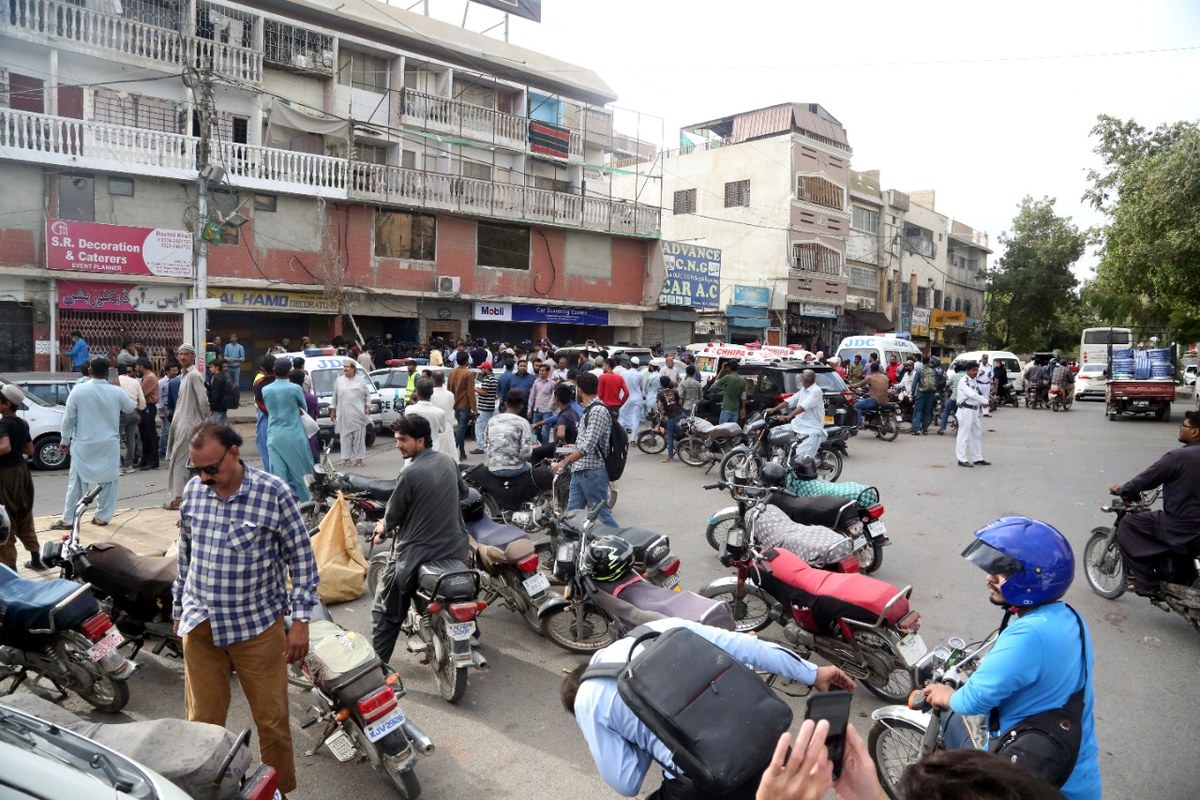KARACHI: Lawmaker and popular religious talk show host Dr. Aamir Liaquat Hussain has passed away in Karachi, hospital and paramedical staff and police confirmed on Thursday, weeks after he announced he would leave Pakistan following a controversy surrounding his third marriage that led to intense criticism of the premier televangelist on mainstream and social media.
He was 50.
Hussain, famous for combining religion and game shows, often courted controversy, most recently about his marriage to a minor girl that ended within three months, with the girl accusing him of inflicting violence on her and using drugs and alcohol regularly during their brief relationship.
Hussain repeatedly denied the charges but the story was widely discussed in Pakistan and raised questions about his credentials as a religious expert, leading a teary-eyed Hussain to announce in a video last month that he had decided to leave Pakistan for good.
A rescue service that moved Hussain’s body to Karachi’s Aga Khan Hospital said paramedics had found him dead at his house.
“When we put him in the ambulance he was already dead,” Shahid Hussain, an official at the Chhipa rescue service, told Arab News.

Onlookers gather outside the house of Dr. Aamir Liaquat Hussain in Karachi, Pakistan, on June 9, 2022. (AN Photo/S.A.Babar)
“We just heard the sad news that Aamir Liaquat, a member of this honorable house has died,” Speaker National Assembly Raja Pervez Ashraf announced, adjourning the ongoing session of parliament until tomorrow, Friday.
Quoting a member of staff at Hussain’s home, Pakistan’s Geo News channel said he had not been well since the previous night but had refused to go to the hospital.
News channels widely reported that Hussain’s body had been moved to Karachi’s Jinnah Postgraduate Medical Center (JPMC) for a postmortem.
“Exact time and cause of death can be ascertained through postmortem,” senior police officer Abdul Raheem Shirazi told Arab News.
Dr. Yahya Tunio, deputy director JPMC, said Hussain’s family had stopped the autopsy after which his body was shifted to cold storage of Chhipa Foundation.
“The family has stopped the autopsy and asked us to wait for his son to arrive from abroad who will decide whether the postmortem should be performed or not,” Tunio told Arab News while adding the state had the power to order postmortem even if Hussain’s son refused it after arriving in Pakistan.
“In such high-profile cases, postmortem should be carried out to put different assumptions and theories to rest,” the official said.

Police stand outside the house of deceased lawmaker Dr. Aamir Liaquat Hussain in Karachi, Pakistan, on June 9, 2022. (AN Photo/S.A.Babar)
Born in July 1971, Hussain rose to fame in the early 2000s with religious chat show, Aalim Online, which brought together Sunni and Shiite clerics and became hugely popular in a society troubled by religious and sectarian tensions. The show was noticed by then military ruler General Pervez Musharraf who in 2005 appointed Hussain a junior minister for religious affairs, a post he held for two years and during which he asked religious scholars to issue decrees against suicide bombings.
Hussain joined cricketer-turned-politician Imran Khan’s Pakistan Tehreek-e-Insaf (PTI) party in March 2018 and was re-elected to the National Assembly in the 2018 general election. In October 2021, he resigned from his seat and left the PTI.
Among Hussain’s many controversies was giving away abandoned babies during a broadcast, and causing uproar by airing hate speech against the vulnerable Ahmedi religious minority.
In 2008, he hosted a show in which Muslim clerics declared that Ahmadis were “deserving of death.” Forty-eight hours later, two Ahmadi leaders, one of them an American citizen, were shot dead in the Punjab and Sindh provinces. In 2014, gunmen in eastern Pakistan shot dead an Ahmadi just days after a cleric denounced the community on Hussain’s talk show.
In 2017, Pakistan’s television regulator banned his talk show for hate speech, after he hosted shows accusing liberal activists and others of an anti-state agenda and blasphemy, an inflammatory allegation that could put their lives at risk.
In recent years, however, Hussain cast himself as a repentant sinner variously declaring that Ahmadis had an “equal right to freedom” and issuing apologies during his TV shows. In interviews, he portrayed himself as a torchbearer for progressive values.
Though Hussain was widely known as a religious scholar, by his own admission, he had little formal religious training apart from a mail-order doctorate in Islamic Studies that he obtained from an online Spanish university in order to qualify for elections in 2002.
“I have the experience of thousands of clerics; in my mind there are thousands of answers,” he said in an interview to the New York Times in 2012.
Hussain’s private life – particularly his marriages – constantly remained in the spotlight. In 2011, embarrassing outtakes from his show leaked on YouTube, showing him swearing during the breaks and making crude jokes with chuckling clerics. Most recently, his marriage to Dania Shah in February, which lasted less than three months, landed him in the media spotlight after Shah filed for divorce and accused Hussain of physical abuse and drug use.
Hamid Hussain, a nephew of the deceased politician, said that he had recently been “depressed due to a social media campaign against him.”
“He had planned to leave the country and despite passing through trauma due to a negative campaign against him on social media, he was well,” Hamid said.
His first wife, with whom Hussain has two teenaged children, would decide the time and date of the funeral, the nephew added.















